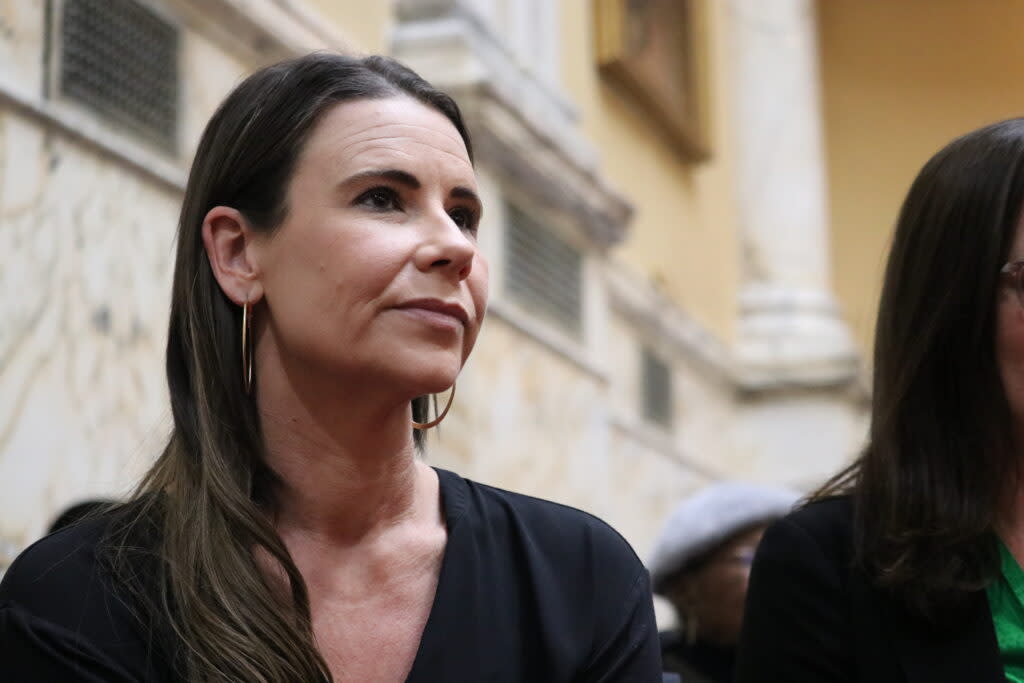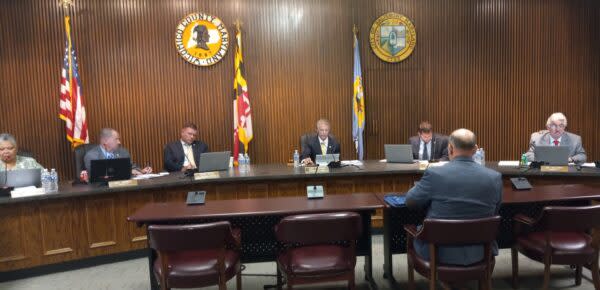Wicomico County Council puts referendum on ballot to do away with county executive’s office

Wicomico County Executive Julie Giordano (R) in a January 2024 file photo from the State House. Photo by Danielle E. Gaines.
A decade of conflict and tension between Republican county executives and the Republican-dominated Wicomico County Council came to a boil Tuesday, as the council voted 5-2 for a ballot referendum asking voters to amend the county’s charter to do away with the elected executive — just two decades after that office was created.
Four Republicans and one Democrat supported the move that – if ratified at the ballot box in November – would restore Wicomico County to a government in which the county council appoints a county manager. One Republican and one Democrat voted against the referendum.
Two nearby Eastern Shore counties, Dorchester and Talbot, currently utilize the county manager structure — under which Wicomico also was governed until voters decided in 2004 to move to an elected council/elected executive form of charter government. Wicomico — the Eastern Shore’s second most populous county, which includes rapidly growing Salisbury — elected its first executive in 2006.
Tuesday’s council vote sparked a furious reaction from County Executive Julie Giordano, a Republican who took office in December 2022, the third elected executive.
“I’m disappointed in five of you —not surprised, but disappointed,” Giordano, a public school teacher prior to running for executive, scolded the council during the public comment period. “You continually make decisions to undermine my office and hurt the morale of the employees and stop the progress of our county.
“I’m letting you know for the next five months, I’m going to be doing everything to ensure that this ballot initiative fails, because we cannot go backwards,” she vowed.
Her comments came two weeks after a crowded public hearing on the proposed referendum, in which Giordano – a conservative activist prior to being elected to public office – vowed to come after her opponents if they succeeded in doing away with the executive. If enacted, the measure would do away with the office at the conclusion of Giordano’s current term, in late 2026.
GET THE MORNING HEADLINES DELIVERED TO YOUR INBOX
The warfare between Giordano and the Republican-majority council echoes recent intraparty strains elsewhere along the Chesapeake Bay. In Cecil County, on the Upper Shore, Executive Danielle Hornberger was ousted last month following an acrimonious Republican primary. Just across the Susquehanna River, Harford County Republican Executive Bob Cassilly has been at odds with members of the county council on issues ranging from budget priorities to access to financial information since he took office at the end of 2022.
In addition to Wicomico, Cecil and Harford, a half-dozen other Maryland counties – Anne Arundel, Baltimore, Frederick, Howard, Montgomery and Prince George’s – are currently governed by elected executives and councils. The remaining dozen counties in the state are run by boards of commissioners.
At Tuesday’s Wicomico council session, the tense relationship between Giordano and fellow Republican John Cannon – the council’s president for much of the last decade – was on display.
“I have found that the executive/legislative form of government in Wicomico County doesn’t seem to be an effective means by which to govern. I have found over the years that it’s not as efficient, not as cost effective” as the county council/county manager structure, said Cannon, a four-term council member who also frequently butted heads with one of Giordano’s predecessors, Republican County Executive Bob Culver, who died of cancer in July 2020 after six years in office.
Just prior to the vote, Cannon added, “I actually have felt the large majority of time I personally spend — and have spent before with past prior executives — is simply on measures that are countermanding measures the executive may have taken.”
At the public comment session after the vote, Giordano came back swinging, telling Cannon that, three weeks after she assumed office, “You scheduled a meeting to deliver a letter to me calling me a potential criminal, accusing me of misappropriating funds three weeks into office. Of course, it was proven wrong, and our county attorney said no. That’s how our professional relationship started.”

Another Republican, five-term Councilmember Joe Holloway, did not mince words in voicing support for the referendum – a proposal also supported by Cannon, Republican Councilmembers Shane Baker and Jeff Merritt and Democrat Shanie Shields.
Noting that the county had been governed by a board of commissioners or council/manager form of government for 139 years prior to the creation of an elected executive’s post 20 years ago, Holloway said: “I’m sure there were some bumps in the road during that time. But we never saw the spitefulness, the hatefulness, the splitting of government, the name calling — the things that we’ve seen since we’ve had an executive form of government.”
He proceeded to cite a lengthy list of items in which he said the executive’s office had violated the county charter or local statutes and policies, or had failed to seek consent or inform the council of numerous actions.
“Mr. Holloway, you inspired me. I made my own list,” Giordano later shot back. Waving a sheaf of papers that she later delivered to a table in front of the council, she declared, “These are all the inappropriate actions taken by the council.”
The two councilmembers who opposed advancing the referendum were Republican James Winn – elected on a slate of candidates with Giordano in 2022, and seen as her one consistent ally on the council – and Democrat Joshua Hastings.
“I think a county executive is generally a good thing [in order] to have checks and balances, but I think we need to continue to further clarify what makes a successful position,” said Hastings, who advocated increasing the minimum qualifications for those seeking the office and improving its functioning rather than doing away with it.
Need to get in touch?
Have a news tip?
Giordano’s allies, while repeatedly accusing the council of a “power grab” at the hearing earlier this month, also questioned putting it on the ballot barely two decades after it was approved by voters. But Merritt noted Tuesday that an estimated 40% of the current bloc of registered voters had not been county residents or were too young to vote when the question was first asked.
“I think they deserve another chance to voice their opinion,” he said.
The 2004 vote in favor of an elected Wicomico County executive came four years after a petition drive had put a proposed revenue cap on the ballot, which passed – largely in response to a 23% property tax increase imposed by the county council after years of seeking to avoid increases in the tax rate.
Ironically, it was the county council at that time – partly in response to passage of the revenue cap – that moved to put a referendum creating a county executive office. Two decades ago, an elected executive was viewed by some as having the potential to ensure a system of checks and balances in the wake of the large tax increase, while providing a clearer leadership model for a growing county.
But it didn’t take long for conflict to emerge between the council and an elected executive in Wicomico County.
“I’m not sure that the county council – made up of many men and women over these last 18 years — has ever fully gotten comfortable with having this shared governance role,” said Mike Dunn, longtime president and CEO of the Greater Salisbury Committee, whose membership includes many Wicomico businesses.
In a recent interview, Dunn said that, “Regardless of who the county executive is – there’s always been a little bit of tension. And … sometimes there’s been a lot of tension.”
Such tensions were in evidence prior to Culver’s death four years ago, as he and Cannon clashed on several occasions over whether the charter had been followed in submitting executive appointments to the council for confirmation. After a two-month standoff over the appointment of a replacement for Culver in late summer 2020, the council named the county’s then-director of administration, John Psota, as acting county executive.
Psota was narrowly defeated in the 2022 Republican primary by Giordano, who went on to win the seat in November – at which point, the Republican v. Republican battles resumed.

Barely six months into office, when the council refused to consider two of Giordano’s nominees – contending that she had not properly submitted the appointments under provisions of the charter – Giordano sued. After a local court ruled in her favor late last year, the council appealed; the matter is pending before the Maryland Appellate Court.
Such episodes have prompted questions about whether the wording of parts of the county charter may have contributed to the ongoing conflict. Dunn, who chaired a 15-member charter review committee in 2021, recalled: “We went chronologically through the charter, line by line.… Often, throughout the course of our deliberation, we would as a group say, ‘OK now, is this a problem in this section of the charter, because we know it has been in the public eye of late as a point of contention, or is this a personality problem?’”
Asked if the group had reached any conclusions as to whether the wording of some charter provisions – or politics – were at the root of the problem, Dunn said: “At the end of the day, I think we kind of accepted that there’s messiness in government, and we’d do what we can to fix what we think needs correcting – but that even as good as we might do, there’s going to be conflict.… There’s only so much a charter can do to fix the messiness.”
Such “messiness” may also reflect the national Republican Party divide between the upstart “MAGA” wing associated with Donald Trump and the more traditional party establishment, several sources suggested. While there appears to be little ideological difference between Giordano and the council’s Republican majority, her political rise has come as a member of the Wicomico party’s MAGA wing – which has tended to view veteran councilmembers such as Cannon and Holloway warily as members of the party establishment.
Paradoxically, the battles between Giordano and the council over the future of the executive office have not prevented the two sides from cooperating on a number of major economic development initiatives in the county in recent months. These range from establishment of a sanitary commission (Wicomico had been the only remaining county in the state without a sanitary commission or wastewater authority) to ending the county-run liquor monopoly and moving the central library to another location to make way for erection of a performing arts center in downtown Salisbury.
“These are significant, historic things that have happened in the last two to three months. I don’t know of anything that hasn’t happened as a result of all this disputing,” Dunn said. “Despite all of this stuff, there is evidence of [the council and executive] getting the work done.”
The post Wicomico County Council puts referendum on ballot to do away with county executive’s office appeared first on Maryland Matters.

